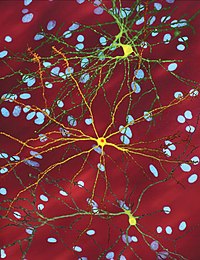
Photo from wikipedia
Introduction Executive dysfunctions in psychotic disorders, mainly schizophrenia are well-known phenomenon, however the information about executive functioning in subclinical psychotic states are still scarce. The rationale for focusing on the… Click to show full abstract
Introduction Executive dysfunctions in psychotic disorders, mainly schizophrenia are well-known phenomenon, however the information about executive functioning in subclinical psychotic states are still scarce. The rationale for focusing on the delusion-proneness (delusion-like states) is suggested role of executive dysfunction in the process of developing delusions. Aims Our aim is to assess the relationship between delusion-proneness and executive functions. Objectives We would like to assess two cognitive functions: shifting and inhibition and updating, depending on the severity of delusion-like symptoms. We expect that higher delusion-proneness is associated with more pronounced executive dysfunctions, as it is observed in clinical population with existing delusions. Methods In order to assess delusion-proneness, we used Polish version of Peters et al. Delusions Inventory (PDI). To evaluate shifting and inhibition, two test were conducted–Berg's Card Sorting Task (BCST) and Stroop task respectively. Correlation analysis were performed. Results Sixty-four participants (41 women and 23 men) were recruited in this study. Mean age was 28.8, SD = 10.37. Statistical analysis revealed significant negative correlation of PDI distress subscale and BCST non-perseverative errors. The overall score, as well as all PDI subscales correlated negatively also with the Stroop task's total number of errors and positively with the accuracy in incongruent variant. Conclusions Contrary to our expectation, results have shown that delusion-proneness is associated with better results in executive functions test, especially in terms of accuracy. These results suggest that executive functions may play a role in the development and maintenance of delusional ideation, however, its relationship may be a bit more complex. Disclosure of interest The authors have not supplied their declaration of competing interest.
Journal Title: European Psychiatry
Year Published: 2017
Link to full text (if available)
Share on Social Media: Sign Up to like & get
recommendations!